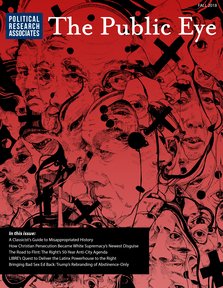In the face of a crushing debt crisis, it seems unavoidable that students will stop reading great works of literature and instead spend their costly college education studying topics that are more likely to directly lead to financial rewards. Frank Bruni’s May op-ed in The New York Times1 is only one of many premature obituaries for the humanities published in recent years. But the value of studying the humanities has found an unlikely (and unwanted) group of defenders in the White nationalist “Alt Right”—or, more specifically, what is sometimes called the “Alt Lite,” a closely allied subgrouping that eschews outright A term that describes various post-WWII political doctrines, organizations and movements that portray themselves as successors to or inspired by German Nazism. Learn more in favor of coding White supremacist views as a celebration of “Western culture and civilization.”
These groups have become some of the most vocal proponents of reading classic works of (European) literature. In an August 2016 manifesto titled “A Normie’s Guide to the A term from the 2010s to describe far-right activists rooted in paleoconservatism with more explicit racism & xenophobia. Learn more ,” published on the neonazi site The Daily Stormer, Andrew Anglin wrote that one of the movement’s mandates was “Endorsement of White History.” Anglin, the site’s founder, wrote, “Rejecting revisionist arguments by modern social scientists which portray Whites as having wrought evil on the planet, we view Whites as the creators and maintainers of Western civilization.” Next to Anglin’s text was a photograph of the Colosseum in Rome.
Ancient Greece and Rome are an origin point of sorts for the Alt Right: an imagined golden age of White supremacist A system of social control characterized by rigid enforcement of binary sex and gender roles. Learn more they can idealize and aspire to recreate. Many classical scholars first became aware of this phenomenon in the weeks following the presidential election of Donald Trump, when the White nationalist group Identity Evropa papered college campuses with posters depicting vague White supremacist slogans alongside both classical sculptures and more recent sculptures in a self-consciously classicizing style.2 These images use classical art as a kind of visual shorthand for aesthetic ideals that were also leveraged by the Nazis, as classicist Sarah Bond has argued.3 (Famous ancient sculptures are also often used in the bizarre digital art that accompanies so-called “fashwave” music, a subgenre of electronic music that Anglin once deemed “the Whitest music ever.”4)
But even before the Alt Right entered the public consciousness in the summer of 2016, Far Right online communities were looking to ancient Greece and Rome for confirmation of their views. It doesn’t take much searching in their virtual fora to find articles glorifying ancient history and historical figures. These fascinations are widespread within different subgroups of “The Red Pill” community, as many men’s rights activists refer to their loose coalition. The Alt Right is particularly fond of Classical Sparta, a society that they believe exemplified both male virtue and ethnic purity. The first century CE Roman poet Ovid has been embraced as the original seduction guru5 by the pickup artist community—a splinter of the men’s rights world that, as writer David Futrelle has explained, is closely enmeshed with the Alt Right.6 Texts from Stoic philosophy, such as Marcus Aurelius’ Meditations and Epictetus’ Enchiridion, appear on recommended reading lists on websites promoting masculine self-improvement.7 These ancient exemplars lend The Red Pill and Alt Right communities a sheen of intellectual credibility and lineage, convincing them that Western Civilization was founded on the very same values that they glorify.
In its idealization of ancient Greece and Rome as a golden age of “White culture,” the Alt Right overlooks the historical fact that ancient Greeks and Romans themselves were not actually “White” in any meaningful sense. Although ancient Mediterranean societies had a concept of race, it was very different from our own—different enough that many scholars prefer to use the less charged term “ethnicity.” Curricula have been developed for professors of the classics and other scholars seeking to incorporate these discussions into their cultural studies programs. Interested readers can find many useful resources in the bibliography prepared by Classics at the Intersections.8
The Alt Right, however, has brushed aside the complexity of scholarly discussion about race in the ancient world as little more than politically correct nonsense. Worse, they erupt with fury at scholars who attempt to infuse these discussions with some nuance, subjecting them to a virtual tidal wave of online abuse ranging from harassment on social media to emailed death threats to hacking and doxxing. The prominent British classicist Mary Beard incurred their ire last summer when she wrote in support of a BBC cartoon about Roman Britain9 that contained some dark-skinned characters. More recently, Alt Right websites and YouTubers have shifted their focus to the casting of David Gyasi, a Black actor, to play Achilles in the BBC miniseries Troy: Fall of a City (the backlash to which was documented thoroughly in the classicist blog Pharos.10)
It hardly needs saying that the Alt Right’s impassioned defense of the humanities isn’t one that most scholars of the discipline welcome. In addition to using the ancient Mediterranean to promote an ideology that is proudly racist and sexist, members of the Alt Right frequently refer to “facts” about classical antiquity that are misleading or flat-out wrong, like the canard that immigration caused the fall of the Roman empire.11 This talking point, popular among conservative politicians going back as far as Enoch Powell’s infamous 1968 “rivers of blood” speech, is taken as a statement of fact by the Alt Right, although the reality was considerably more complex.12
In spite of these inaccuracies, the Alt Right’s enthusiasm for ancient Greece and Rome is one that we need to take seriously. And in its own way, it makes an excellent case for saving the humanities. Not because we need to preserve and celebrate something called “Western civilization,” which, as Kwame Anthony Appiah has argued,13 is a deeply flawed and problematic construct, but because only by asserting the value of careful, nuanced scholarship on these issues can we counteract their pernicious misrepresentations of history.
- Endnotes
- Frank Bruni, “Aristotle’s Wrongful Death,” The New York Times, May 26, 2018, https://www.nytimes.com/2018/05/26/opinion/sunday/college-majors-liberal-arts.html.
- Ben Davis, “The New A social movement based on a belief in biologically determined racial hierarchies, often with the ultimate goal of establishing an all-White nation state. Learn more ’s Sloppy Use of Art History, Decoded,” artnet News, March 7, 2017, https://news.artnet.com/art-world/identity-evropa-posters-art-symbolism-881747.
- Sarah E. Bond, “We Need to Start Seeing the Classical World in Color,” Hyperallergic, June 7, 2017, https://hyperallergic.com/383776/why-we-need-to-start-seeing-the-classi….
- Jip Lemmens, “Putting the ‘Neon’ in ‘Neo-Nazi,’” Eidolon, October 19, 2017, https://eidolon.pub/putting-the-neon-in-neo-nazi-4cea7c471a66.
- Donna Zuckerberg, “Bang Rome,” Eidolon, December 21, 2015, https://eidolon.pub/bang-rome-2214f4a3d5c5.
- Claire Landsbaum, “Mens Rights Activists Are Finding a New Home With the Alt-Right,” The Cut, December 14, 2016, https://www.thecut.com/2016/12/mens-rights-activists-are-flocking-to-the-alt-right.html.
- For example, see: Robert Conti, “6 Powerful Passages From Meditations By Marcus Aurelius,” The Return of Kings, January 29, 2014, http://www.returnofkings.com/27793/6-powerful-passages-from-meditations….
- “Resources for Teaching Race and Ethnicity, Immigration and Marginality in Classical Antiquity,” Classics at the Intersection, https://rfkclassics.blogspot.com/p/teaching-race-and-ethnicity.html.
- Mary Beard, “Roman Britain in Black and White,” TLS, August 3, 2017, https://www.the-tls.co.uk/roman-britain-black-white/.
- “Archive for Black Achilles,” Pharos, https://pages.vassar.edu/pharos/black-achilles/.
- Josephine Livingstone, “Rod Dreher’s Bad History,” The New Republic, July 3, 2018, https://newrepublic.com/article/149527/rod-drehers-bad-history.
- Dan-el Padilla Peralta, “Barbarians Inside the Gate, Part 1,” Eidolon, November 9, 2015, https://eidolon.pub/barbarians-inside-the-gate-part-i-c175057b340f.
- Kwame Anthony Appiah, “There is No Such Thing as Western Civilization,” The Guardian, November 9, 2016, https://www.theguardian.com/world/2016/nov/09/western-civilisation-appiah-reith-lecture.

